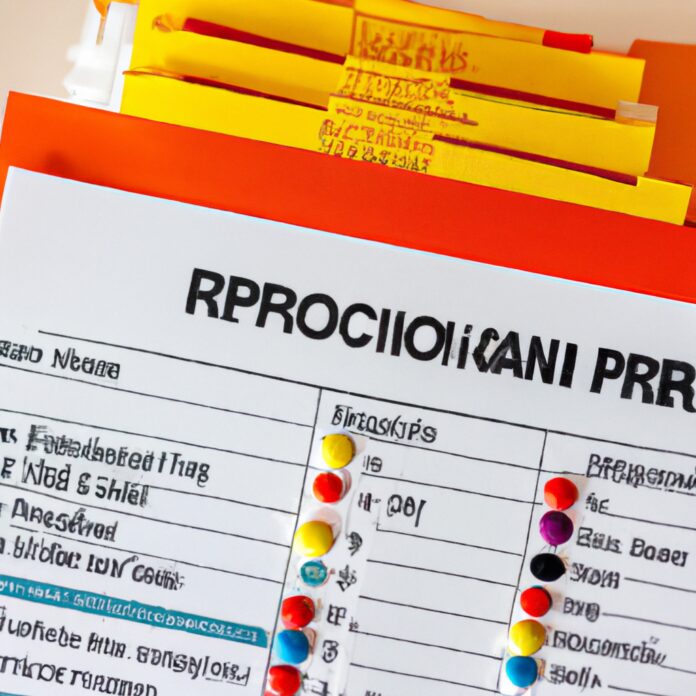Managing medications can be overwhelming – whether you are dealing with your own prescriptions or helping organize those of a loved one. From remembering to take medications on time to knowing when it is time to refill a prescription, there can be a lot to stay on top of. But it doesn’t have to be overwhelming. Read on to discover some of our top tips for managing medications and staying on top of prescriptions.
1. Picture Perfect: Strategies for Organizing Medication
Taking medications may be overwhelming for some, as most often, a high number of medications need to be ingested for certain conditions. However, there are many strategies for organizing medications to make the process simpler and to ensure that medications are taken correctly and on time.
Prepare and divide medications. Separating medications into marked individual containers depending on the day and time helps avoid confusion when multiples of a medication need to be taken throughout the day. Additionally, large pill boxes can be filled weekly or monthly. Pills in containers can be labeled with a permanent marker.
Plan ahead. Updating any changes to medications or dosages ahead for a set schedule helps overview medication needs for the time ahead. It also aids in ensuring that the right medications are taken on time. You can further streamline the process by setting reminders on your phone for medication challenges.
Keep track and reassess. Make sure to keep track of all the medications that have been taken during the day. This can be done manually, doubly ensuring that the right medication has been ingested. Additionally, take time to reassess what medications are being taken on a regular basis, as physicians regularly change and update medications and their dosages.
- Separate medications into individual containers
- Plan ahead for the time ahead
- Keep track and reassess medications regularly
Organizing medications may seem intimidating, but with the right strategies, it can make taking medications more efficient and stress-free. With these methods, you’ll be well on your way to a picture perfect system for organizing medications.
2. Keeping Track of Your Prescriptions: The Tips and Tricks
The number of medications people take can increase as they age, that is why it’ s so important to keep accurate records of what prescriptions you are taking. Here are some simple tips and tricks to keep track of all of your medications throughout your life:
- Create a master list of all prescription medications – Your list should include each medication’s name, dosage, frequency, purpose, prescribing doctor, and pharmacy. Anytime you start or stop a medication, make sure to note it.
- Set up medication alerts. – Most pharmacies offer medication notifications for refills, which can be really helpful. This way you won’t forget when it’s time to pick up a refill. If your pharmacy doesn’t offer this, consider setting up calendar or phone alerts for yourself.
- Carry an updated medication list with you – Print out a copy of your master list and keep it with you in in your purse, wallet, or car. This way if you need to visit another doctor or pharmacy, or even travel at some point, you have a comprehensive list of medicines you are taking handy.
With a little bit of effort, you can stay on top of all of your prescriptions. Keeping track of your medications is an important part of self-care and wellness. Taking these simple steps to keep your medication list up to date will help make sure that your doctor and pharmacy always have the most accurate information, so they can provide you with the best care.
3. Accurately Administering Dosages: What You Need to Know
Ensuring Accuracy in Dosage Administration
Accurately administering dosages is a crucial part of the medical field. As a professional, it is important to take the time to ensure every dose is correctly measured and given to the patient. Here’s what you need to know about correctly administering dosages:
- Check all labels and units of measure for the medications.
- Coordinate the distribution process to avoid confusion.
- Calculate the quantities to be delivered.
Take all precautions to prevent errors in amount, strength, route, or in administering by the wrong patient. Plus, since most patients receive more than one medication, make sure that the dosage for each is correctly specified. Such close attention to detail reduces the risk of harmful medication errors and increases patient safety.
It is also essential to store medications in proper temperature controlled and secure conditions. It is not enough for medical professionals to give an accurate dose—the drug must also remain sterile and safe from contamination. Take the necessary steps to preserve drugs with integrity.
4. Refill Reminders: Defining Your System
In today’s busy world, it’s easy to forget the small tasks of life like refilling prescriptions or scheduling doctor’s appointments. That’s why having a system in place to remind you of these tasks is essential. Here are four tips to help you create a system that works for you.
- Set Calendar Reminders: Whether you use your computer, smartphone, or paper calendar, it’s important to set reminders for upcoming refill dates. Doing so will give you peace of mind throughout the month, knowing that you won’t forget to refill a prescription.
- Schedule ahead of Time: Know when your refills and doctor’s visits are coming up, and schedule them ahead of time. Doing this will save you from stress and panic associated with a last minute rush.
- Prepare a List: Keep a list of all your prescriptions, their doses, and refill dates handy. You can even write down the contact information of your pharmacy and doctor. Having all your information in one place will make it easy to track refills and make any necessary changes.
- Be Proactive: Don’t wait until the last minute to order a refill for your medication. Ordering in advance can save time and unnecessary stress. Call your pharmacy in advance to ensure they have the right medications available and in stock.
Once you establish a system for tracking and refilling prescriptions, you can be sure to have a smooth and stress-free experience. By taking a proactive approach and staying organized, you can easily manage your medical needs and take control of your health.
5. Striking a Balance: Overseeing Your Medication Intake
Understanding your medication intake is key to avoiding health risks. It is important to ensure that you are taking medication correctly to ensure that it is as effective as possible and keeps you as healthy as possible. Here are a few tips to help you achieve the proper balance:
- Know Your Medication: Get to know what each of your medications does, how frequently they should be taken, and how they interact with other medications. Store this information in an easily accessible place.
- Plan Ahead: Schedule ahead of time when you need to take your medication and make sure you don’t forget. Make sure to factor in any travel when scheduling.
It is also important to monitor your dosage and not increase it without consulting your doctor. If you experience any side effects, call your doctor as soon as possible to discuss. Speak to them about pain management and don’t be tempted to dose above the prescribed limit.
Finally, it is also important to be aware of any potential allergies and drug interactions. Be sure to consult with your doctor before taking any new medication and provide a list of all the drugs you are currently taking.
Staying on top of your medication can seem like a daunting task, but with the right tips and strategies, it can be manageable. Think of it as an opportunity for self-care and to practice mindfulness in your life. With a little bit of planning and dedication, taking medication can be a breeze—so get out there and take control of your medications today!





